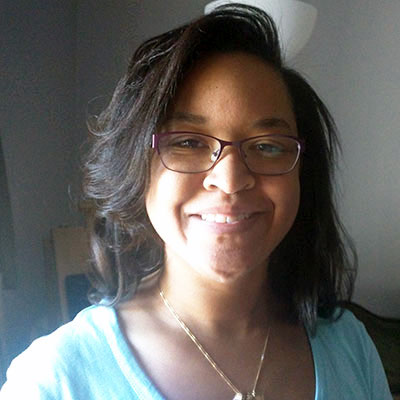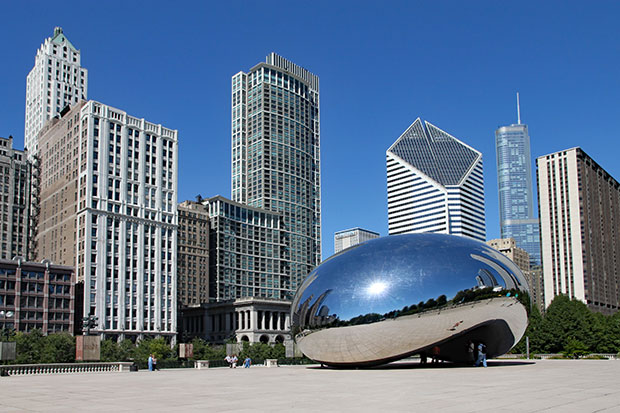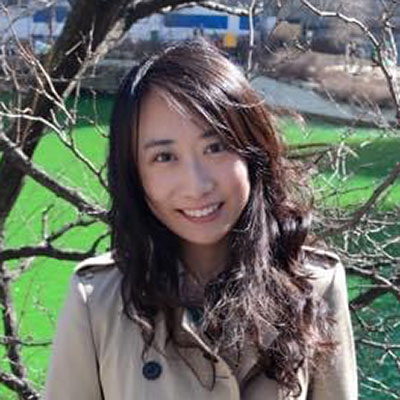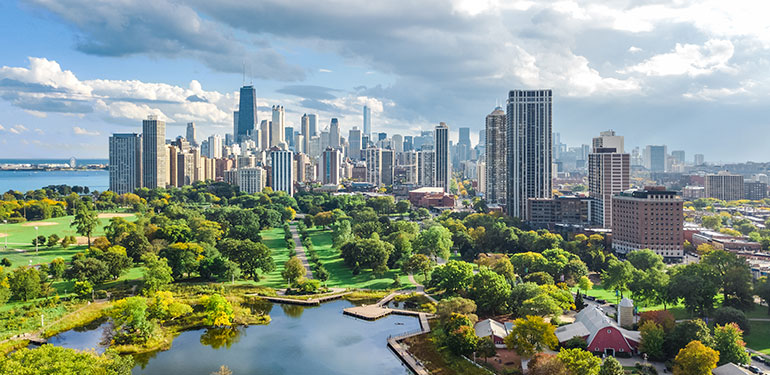Career Development / Where to Work in BiotechBiotechnology in Chicago
Fast facts
Population: 2,746,388 (2020), 3rd largest in US
Area: 234 sq miles
Nicknames: The Windy City, City of Big Shoulders, The Second City, The White City
Top Sights: Art Institute of Chicago, Millennium Park, The Magnificent Mile, Lake Michigan, Navy Pier
Biocluster Size: 10th largest in the country1
A historic past and a thriving future
Darcie Patterson (MBP '14) grew up in southern California and earned her BS in biology from Hawaii Pacific University. After four years in the sunny paradise, Patterson moved to Chicago, to pursue her MBP from Northwestern. She thought she was prepared for the change in climate.

"I thought I was ready for 'chilly,'" Patterson said. "(One day) I think it was 42 degrees and I nearly froze walking around campus."
Winters in Chicago get far worse than 42 degrees, but Patterson fell in love with the Chicago area, where she's lived since her initial move to Northwestern in 2012. "Winters are beautiful but cold," she said. "Spring has amazing blooms, fall is full of orange, yellow, and red leaves, and summer is lively and humid."
Patterson currently works in supplier quality and distribution at Alexion Pharmaceuticals. The company is located in Boston but she is based in one of Chicago's northern suburbs. Chicago itself is made up of 77 community areas and is the third largest city in the country by population. The larger Chicagoland or Chicago metropolitan area includes suburbs that stretch across more than a dozen counties and include parts of Indiana and Wisconsin. It is also the third largest metropolitan area in the country.

"People told me if I wanted to get into health technology or medical devices, I was going to have to leave Chicago, as there wasn't much going on here," Shanley said. "But there was a concerted effort to create this community to keep people here, and I think it's been very successful."
As senior director of operations at medical device startup Attune Medical, Shanley jokes he has his hands in everything the company does — with the exception of marketing and selling its product. He was the first full-time hire at the company and has played a major role in the company's growth. Today, Attune Medical has 11 employees and regulatory approval on three continents.
A good chunk of that growth, Shanley said, is owed to the City of Chicago, which has supported a push to make the city a hub for innovation. TECHicago reports that there are more than 6,150 tech companies in the Chicagoland area, and there have been more than 375 startups founded in the past five years. Tech incubators like 1871 and Matter have helped innovation thrive in Chicago. In June 2021, Forbes even published a story titled "Why Chicago May Be The Best City To Find A Tech Job."
"It's not as huge as Boston or Silicon Valley, but there is a very real community happening here," Shanley said. "You've got a lot of support from the local government encouraging small healthcare businesses and startups, and a diverse community of people who love what they do and are very collaborative."

That diversity is one thing Yi Song (MBP '12) has always noticed about Chicago. Song witnessed biotech companies across the city grow by attracting experienced professionals and young graduates alike from a wide range of backgrounds. Top-tier universities like Northwestern and the University of Chicago, for example, play a key role in contributing to Chicago's growing biotech scene.

Her company is also based in one of Chicago's northern suburbs. She may not work in the heart of the city, but that doesn't stop her — and companies of all sizes — from appreciating all the city has to offer. "Chicago's diverse culture and being one of the biggest cities in the United States is very attractive to companies, especially global ones. The great universities and hospitals in the greater Chicago area are also playing an important role in providing talent and innovative technology to the biotech industry."


